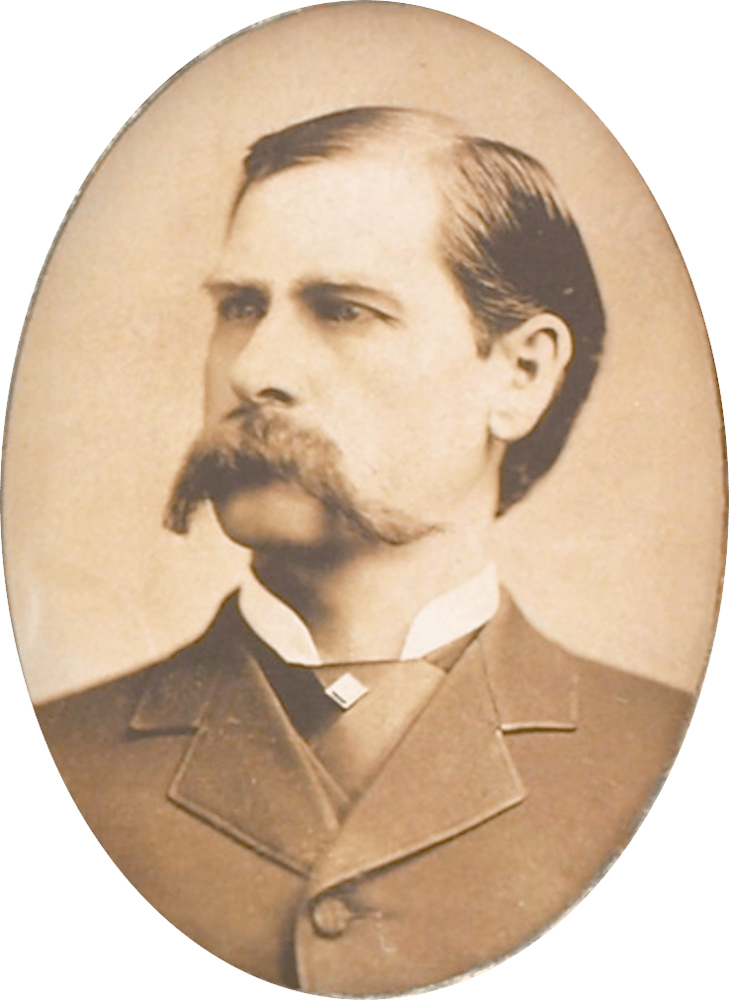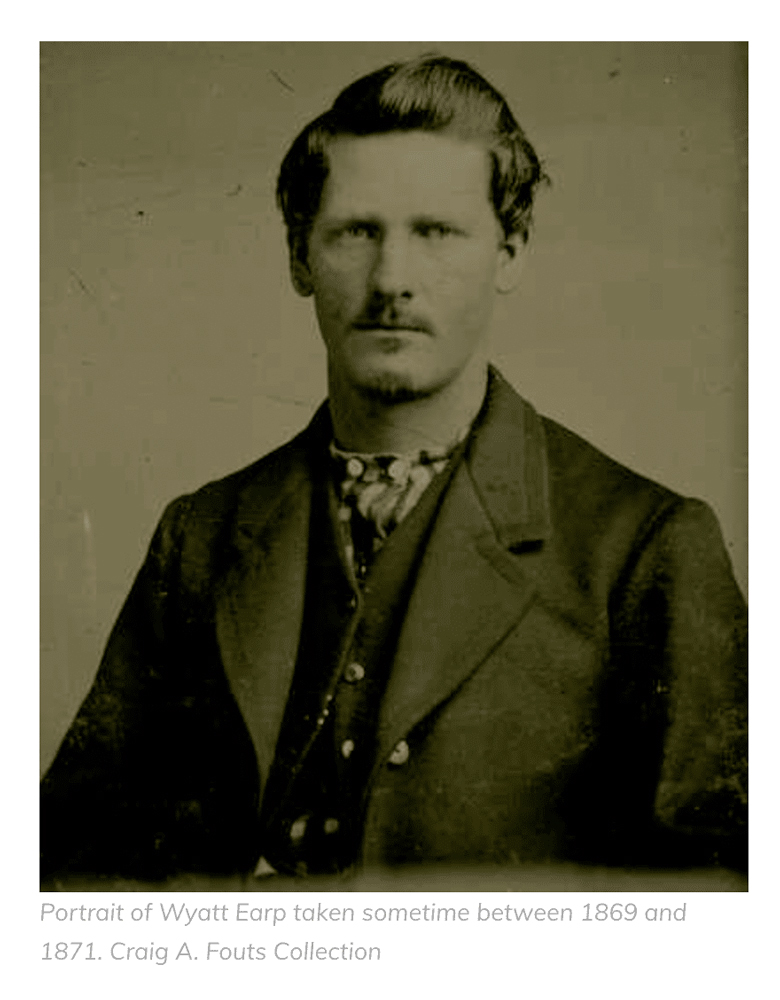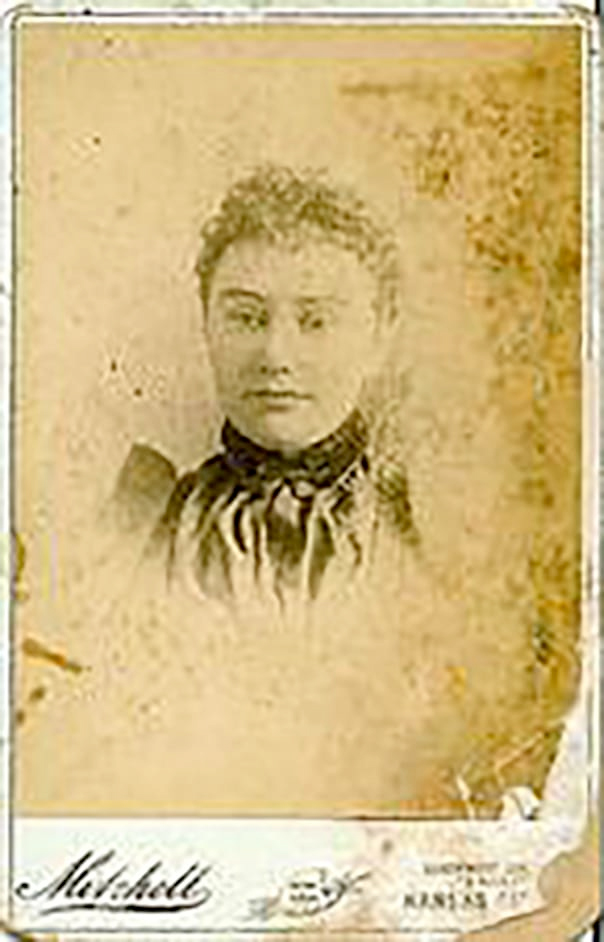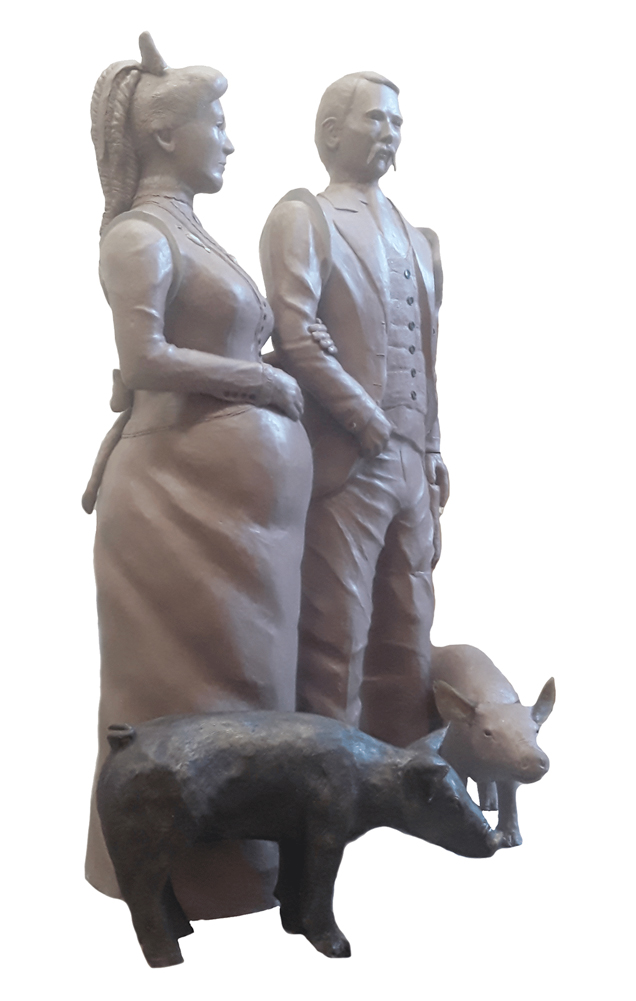The Untold Story of Wyatt Earp in Missouri
In Missouri History | By Ron Soodalter
This article is from the Missouri Life Magazine, which appeared in their January/February 2023 issue.
Please visit www.missourilife.com, or a direct link to this article.
Lawman Wyatt Earp is immortalized in books and movies, but he first wore a badge in the Missouri town of Lamar. When he left town a couple of years later, there was a warrant out for his arrest. Why did Wyatt want to forget his life in Lamar?
There was a very human Wyatt Earp, with his share of flaws and foibles, long before he was glorified on the screen by such cinematic luminaries as Burt Lancaster, Kevin Costner, Kurt Russell, Joel McCrea, Henry Fonda, Hugh O’Brian, and Richard Dix. When Wyatt assumed the position of constable of the quiet Missouri town of Lamar at the tender age of 21, he bore little resemblance to the grim, heavily mustached lawman who would earn a reputation as a shootist and professional gambler in such wide-open towns as Wichita, Dodge City, and Tombstone. Nonetheless, standing at a lean, well-muscled six feet, the rangy youth made an impression that was further enhanced by the badge pinned to his coat.
Wyatt was born in Monmouth, Illinois, in 1848. His father, in tribute to his old Mexican War commander, had graced his son with the man’s full name: Wyatt Berry Stapp. Throughout his life, however, the son chose to leave out the first of the two middle initials—for obvious reasons—and signed his name “Wyatt S. Earp.”

Photo Courtesy of Wikimedia Commons from Missouri Life

Photo Courtesy of Wikimedia Commons from Missouri Life
Including a half-brother from his father’s earlier marriage, Wyatt placed fifth out of 10 in the Earp family’s birth order, between older sister Martha and younger brother Morgan. His father, Nicholas Porter Earp, himself an impressive-looking character with a full grey patriarchal beard, had a sternness and a humorless cast to his eyes that Wyatt inherited. Three of Nicholas Earp’s sons, including Wyatt, would become known to Frontier America as the “Fighting Earps.” Nick, as he was called, would live 94 years, during which time two of his sons would be crippled and two others killed by gunshot.
The restless Nick Earp was what would have been referred to at the time as fiddle-footed. During his lifetime, he worked as a cooper, farmer, justice of the peace, wagon master, storekeeper, constable, judge, and bootlegger. Born in what would become West Virginia, he was never content to remain long in one place. Initially living with his wife in Kentucky, over the years he would move his ever-expanding family to Monmouth, and—after a stint in the Mexican War—back and forth between Illinois, Iowa, and Kentucky. During the Civil War, the west coast beckoned, and he led a wagon train to California. There, a teenaged Wyatt, who had become infected with his father’s wanderlust, took work hauling freight over thousands of miles and grading track beds for the Union Pacific Railroad.
Predictably, California could not long hold Nick Earp. In 1868, he gathered his wife and three at-home children and moved back to Iowa. Just a year later, he was living on a 240-acre farm in the fledgling community of Lamar, Missouri. Shortly thereafter, 21-year-old Wyatt left his railroad job and joined him. Curiously, although he would later dictate his life story to two separate biographers, often embellishing his account with outlandish tales and claims of derring-do, Wyatt chose never to mention the time he spent living in Lamar.
THE NAME OF THE LAW
The southwestern Missouri town of Lamar, seat of Barton County, was founded in 1856. It was named for Mirabeau Lamar, the first president of the Republic of Texas, who was reportedly a former school chum of the town’s founder. Situated on the edge of what was then considered the frontier, it was sedate by the time of the Earps’ arrival. One historian described it as a “sleepy, settled Lamar.” Nonetheless, it had a rip-roaring early life. According to local lore, the notorious rebel guerrilla leader William Clarke Quantrill raided the small community twice during the Civil War.
When Nick Earp arrived in Lamar, he immediately saw an opportunity. In addition to running his farm, he got himself elected town constable, a position he soon traded for that of justice of the peace. For his part, Wyatt assumed his father’s former role as constable, the first in what would become a career of law enforcement positions. At this juncture, the Earps—father and son—controlled the law business in Lamar, including the levying and collecting of fines. Initially, the townsfolk seemed content with the father-and-son Earp team. Commenting in the local Southwest Missourian newspaper, a contributor wrote, “This is a good appointment, and when our city dads get the machine in grinding order, lawbreakers had better watch out.” Since this was the day of personal insertions in the papers, it is not inconceivable that either Wyatt or Nick wrote it himself. Nonetheless, it is a fact that things did go smoothly, at least for a time.
Meanwhile, Wyatt seized an opportunity of another sort, when he wooed and wed a young local girl, Urilla Sutherland, daughter of Lamar’s hotel owner. As a newly minted justice of the peace, Nick performed the ceremony himself. Wyatt and his bride soon purchased a house and lot on the edge of town where they set up housekeeping while Wyatt plied his trade as the local lawman.

Photo Courtesy of Wikimedia Commons from Missouri Life

Photo Courtesy of Wikimedia Commons from Missouri Life --
Law enforcement in Lamar was far from that found in notorious, shoot-’em-up Kansas cow towns like Abilene, Wichita, and Dodge City. On one occasion, Wyatt was called upon to arrest a pair of drunks—brothers, as it turned out—who were creating a disturbance. He collared the inebriated siblings and escorted them to the stone building that passed for the town jail. As reported in the Southwest Missourian, the two “were brought before Esq. [Nicholas] Earp, and fined $5 and costs, each. A few more examples and the town will be better for it.”
On another occasion, both Nick and Wyatt became involved in a civic dispute regarding a herd of pigs that were roaming the streets. The burning question was whether it fell under the lawmen’s purview to drive and corral the beasts. Again sensing opportunity, Nick, who opposed containing the animals, ran for a seat on the town’s board of trustees on the strength of his position on the issue. He won both the argument and the position. Then there was the time when an irate butcher accosted Wyatt, accusing him of taking his pencil and demanding a replacement. According to the newspaper at the time, Wyatt lured the man to the jail, gave him a replacement pencil, and proceeded to lock him up. The butcher soon escaped through a hole in the roof and left for parts unknown.
Overall, although the job’s demands were minimal, Wyatt appeared to be an effective peace officer, as well as a settled married man and homeowner. Then tragedy struck. Less than a year into their marriage, Urilla suddenly died. For a century and a half, biographers and historians have conjectured the cause of her death. While some maintain that she had fallen victim to typhus, others claim that both she and the infant she was carrying died in childbirth. It is one of those historical conundrums that will likely never find a resolution. Whatever the circumstances, it signaled a marked change in Wyatt.
Shortly after Urilla’s death, Wyatt and his brothers became embroiled in a no-holds-barred brawl in Lamar’s streets with his late wife’s two brothers and three of their friends. Battered and bloodied, neither side could claim victory, and as with Urilla’s death, the cause of the fight remains vague. Some contend that the dispute was based on her brothers’ belief that Urilla had been too young to marry and that she had been seduced by the older Wyatt.
A few months later, Wyatt found himself facing two potentially serious legal actions. The first, dated March 14, 1871, came in the form of a Barton County lawsuit against “Wyatt Earp and his sureties” in the amount of $200, which would amount to nearly $4,500 today. The suit alleged that Wyatt, in his role as constable, had collected the specified amount in school funds and had failed to turn the money over to the county.
The following month, a disgruntled citizen brought an action against Wyatt, as well as his bondsman, father, and uncle, on the charge that Wyatt had erased and rewritten a dollar figure on a court document and pocketed a significant portion of the money involved. In April 1871, Wyatt was summoned to appear at a hearing on the matter. However, before Wyatt or his father were brought before the judge, both sold their respective properties and left town. The constable who replaced his widowed predecessor wrote that he had “good reason to believe [and] does believe that Wyatt S. Earp def[initely] is not a resident of this state, that Wyatt S. Earp has absconded or absented himself from his usual place of abode in this state so that the ordinary process of law cannot be processed against him.”
OUTRUNNING A REPUTATION
Controversy continued to follow Wyatt. After leaving Lamar, he rode for the Indian Territory (present-day Oklahoma), where he soon found himself accused of horse stealing—a federal matter. The “Bill of Information” charging him and his cohorts read, in part, “US vs. Wyatt S. Earp, Ed Kennedy, and John Shown … on the 28th day of March A.D. 1871 in the Indian Country … did feloniously willfully steal, take away, carry away two horses each of the value of 100 dollars.”
The three men were arrested. Shown was freed, but Earp and Kennedy were indicted. Kennedy was subsequently acquitted, and Wyatt skipped bail and fled the territory. The case against him was eventually dropped, possibly because of the exoneration of his partner, and he ceased to be a fugitive.
Over the next two years, Wyatt was jailed several times in Peoria, Illinois, where he was working as a pimp and “enforcer” for at least one local madam. Dr. Victoria Loberg, author of Peoria’s Bad Habits: From Wyatt Earp Through the Woodruff Years, writes, “Earp and his brother Morgan were arrested multiple times … for ‘keeping and being found in a house of ill fame.’ ” The former constable of serene Lamar was fast earning himself a reputation, and it was not an enviable one.
At one juncture, after a raid on a floating brothel in which the local police seized Wyatt and several “ladies of the evening,” an article appeared in the September 10, 1872, issue of the Peoria Daily National Democrat, reading in part: “Some of the women are said to be good looking, but all appear to be terribly depraved. John Walton, the skipper of the boat, and Wyatt Earp, the Peoria Bummer, were each fined $43.15. Sarah Earp, alias Sally Heckell, calls herself the wife of Wyatt.” Based on both court records and contemporary newspaper accounts relating to Wyatt’s activities in Peoria, it is more likely that he was her pimp.
Obviously reluctant to relate his Peoria experiences to his later biographers, Wyatt instead told stories of hunting buffalo on the Great Plains during the same period. For much of his young life thereafter, he ranged through various Kansas cow towns. His tough-guy persona was the only credential he needed to land lawman jobs while he continued gambling for his living. Given his unflappable demeanor, quick mind, and utter fearlessness, he became quite proficient at both. For Wyatt, money was always the driving force, and he was constantly alert to the next possible windfall. He had, according to Earp biographer Allen Barra, an “uncanny instinct where the money would be.” When he ultimately moved to the rough-edged mining community of Tombstone, Arizona, with brothers Virgil and Morgan and their domestic partners, it was not initially to serve again as a lawman, but for the express purpose of making his fortune. And when the notorious Johnny Ringo challenged him to a pistol fight, Wyatt reportedly refused, stating simply, “There’s no money in it.”
Since the early days of silent movies, the character of Wyatt Earp has been portrayed on screen in more than 40 film and television productions; to this writer’s knowledge, only one mentioned his life in Lamar, and then only cursorily. Yet, it was the only time in his life in which, however briefly, he was settled. It was in Lamar that two very different events would alter and shape the course of his life: he found what would eventually become a years-long career in law enforcement, but he lost his wife in less than a year.
We may never know the reason why he chose never to include Lamar in either of his self-dictated biographies. Biographer Barra writes, “Wyatt Earp never said much about his Lamar days, going to the extent of writing relatives not to talk to [his] biographer … about the events. He had a secret, and he succeeded in keeping it.”
